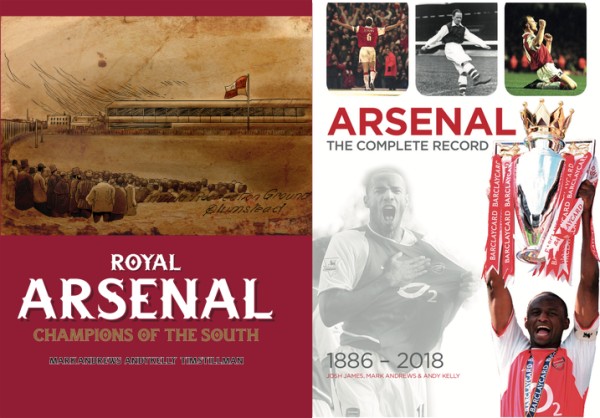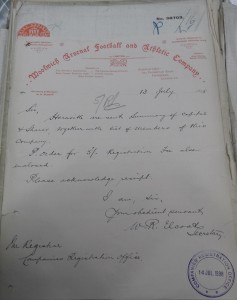by Andy Kelly and Mark Andrews
(@Gooner_AK) (@Royal Arsenal MRA)
The eagle-eyed amongst you who have read through this season’s handbook will have noticed a minor change within the list of managers. Arsenal’s second manager has changed from George Elcoat to William Elcoat. The reason for this is constant badgering of the handbook editor, Josh James, by us. We showed conclusively that since 1986 George Elcoat has been wrongly credited with having managed Woolwich Arsenal, and also showed the date that he started and the date he was “asked to resign”.
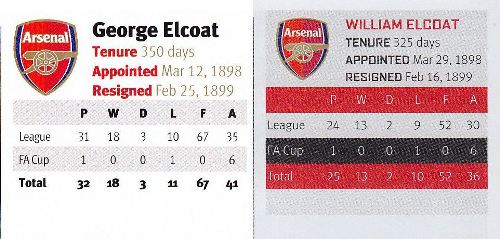
The background to this is story is that according to every Arsenal history written since 1986, George Elcoat was Arsenal’s second manager. From 1905 until 1952 he was only known as Mr Elcoat. Then Bernard Joy wrote “Forward, Arsenal!” and gave him an initial so that he became G. Elcoat. He remained this way until 1986 when the club’s official centenary book was published and gave him a first name – George. Sadly, Bernard Joy and Daniel Feinstein (historian for the centenary book) are no longer with us to explain how they came about this information.
They got the wrong man. We’ve seen that there are a number of historical inaccuracies in Bernard Joy’s book. These have been subsequently copied by other authors. We believe that this is the case with Mr Elcoat.
Arsenal’s second manager was not George Elcoat, but his older brother William Robson Elcoat. William was born in Elton, Durham in 1859. He managed Arsenal between April 1898 and February 1899. And this is how we proved it.
WR Elcoat was one of the original directors when Stockton FC turned professional and became a limited company in 1892. The club also played other sports, one of them being baseball. WR Elcoat was heavily involved in the baseball scene in the area. He was an umpire and chairman of the Cleveland and South Durham Baseball Association.
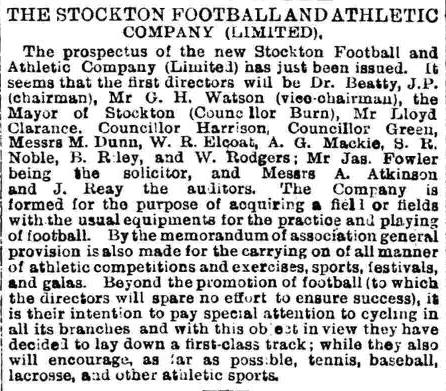
Stockton FC is incorporated
In 1895 the club had problems with the incumbent secretary who had refused to produce paperwork for the club’s accountant to prepare the company accounts for the 1894-95 season. During the AGM in June 1895, the directors sacked the secretary and decided that WR Elcoat should take over the position.
His name was only ever reported in the Stockton local press as WR Elcoat. From the birth, marriages and death registers we can see that only 1 birth with the surname Elcoat and the initials W R was registered before 1900. This was William Robson Elcoat who was born in Stockton in 1859. This can be verified by:
- visiting http://www.freebmd.org.uk/cgi/search.pl
- selecting All Types in the Type box
- elcoat in the Surname box
- w* r* in the First Name(s) box
- and clicking on the Find button
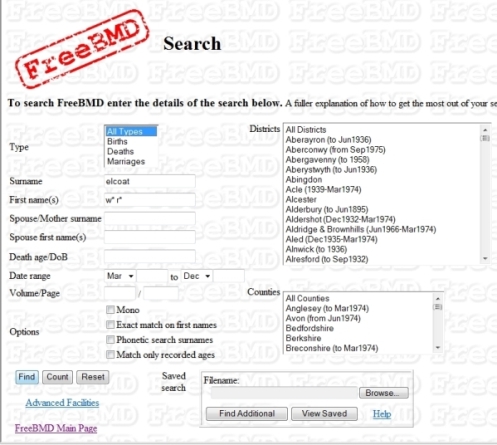
FreeBMD search for W R Elcoat
And here are the results:
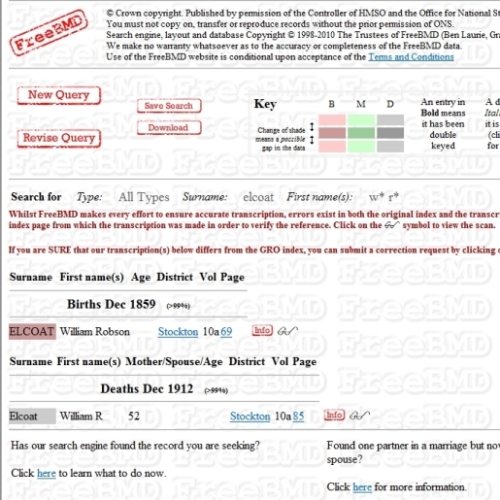
Just the one W R Elcoat
On 10 March 1898, Arsenal’s first secretary-manager, Thomas Mitchell, resigned. We’ve not been able to ascertain whether a caretaker was put in place. If there was, it was probably director Arthur Kennedy (this will become apparent later). Sunderland manager Bob Campbell applied for the vacant position and it was offered to him. He accepted the offer on 18 March 1898 but then had a change of heart and decided to stay at Sunderland. WR Elcoat was then offered the job. He accepted the offer on 30 March 1898 and he took up the reins during the week commencing 11 April 1898.
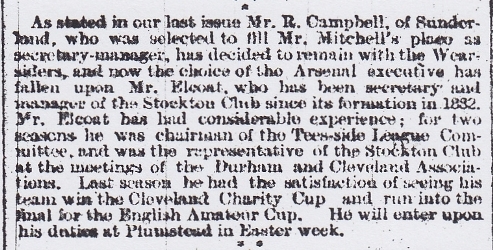
Kentish Mercury announces Elcoat’s arrival
The club did not give a reason as to why they chose Elcoat but, financially, Stockton FC was run very well which would have been a positive for the Woolwich Arsenal directors. Also, Elcoat may have been friends with Woolwich Arsenal director Jack Humble who came from the same area.
At Woolwich Arsenal’s AGM on 23 June 1898 the Woolwich Herald reported that W.R. Elcoat was there as the club’s manager.
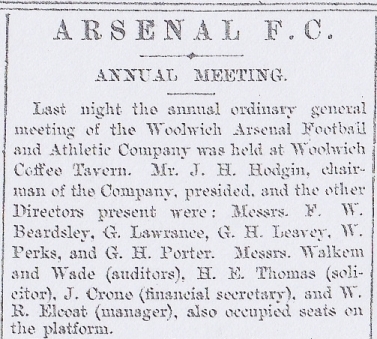
Woolwich Arsenal’s AGM in 1898
Elcoat’s tenure at Arsenal was just under a year. He was asked to resign on 16 February 1899.
When he took control of the team it was 3rd in the Second Division and he left them in 6th place. Director Arthur Kennedy was installed as caretaker secretary-manager for the remainder of the season.
However, the most conclusive proof that William Robson Elcoat was manager of Woolwich Arsenal is the following document unearthed by Mark. (Click to enlarge)
Does anyone still believe that it was George Elcoat?
Something that I’ve recently found is a history of Woolwich Arsenal published in The Book Of Football in 1905. This was not actually a book but a magazine published in 12 fortnightly instalments. Part 1 was issued on Friday 20 October 1905 and contained the history of Woolwich Arsenal F.C, written by the club’s vice-chairman, Arthur Kennedy. What I find strange is that Kennedy states the names of Arsenal’s first four managers: Mr. T.B. Mitchell, Mr. Elcoat, Mr. Harry Bradshaw and Mr. Phil Kelso. For three of them he gives either their initials or first name. But Elcoat is recognised only as “Mr.” At the time that Elcoat was secretary-manager of Arsenal, Kennedy was the club’s financial secretary. I would have thought that they would have met on numerous occasions. Surely he must have known Elcoat’s name or even his initials.
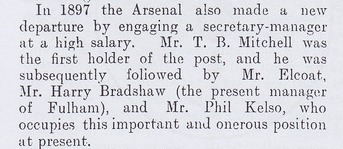
Arthur Kennedy’s list of early Arsenal managers
After leaving Woolwich Arsenal he unsuccessfully applied for the vacant manager’s job at Tottenham then returned to the family home in Stockton with his mother and siblings. He remained unmarried and died in Stockton in 1912.
We would like to thank Josh James for having faith in us, and ask that you keep an open mind to what has been written previously about the club’s early history.
—————–
Don’t forget to subscribe to the blog (top right). You know it makes sense.
Or have a look at our other site: The Arsenal Collection for more Arsenal memorabilia.
Copies of our books Royal Arsenal – Champions of the South and Arsenal: The Complete Record 1886-2018 are still available from the publishers.
